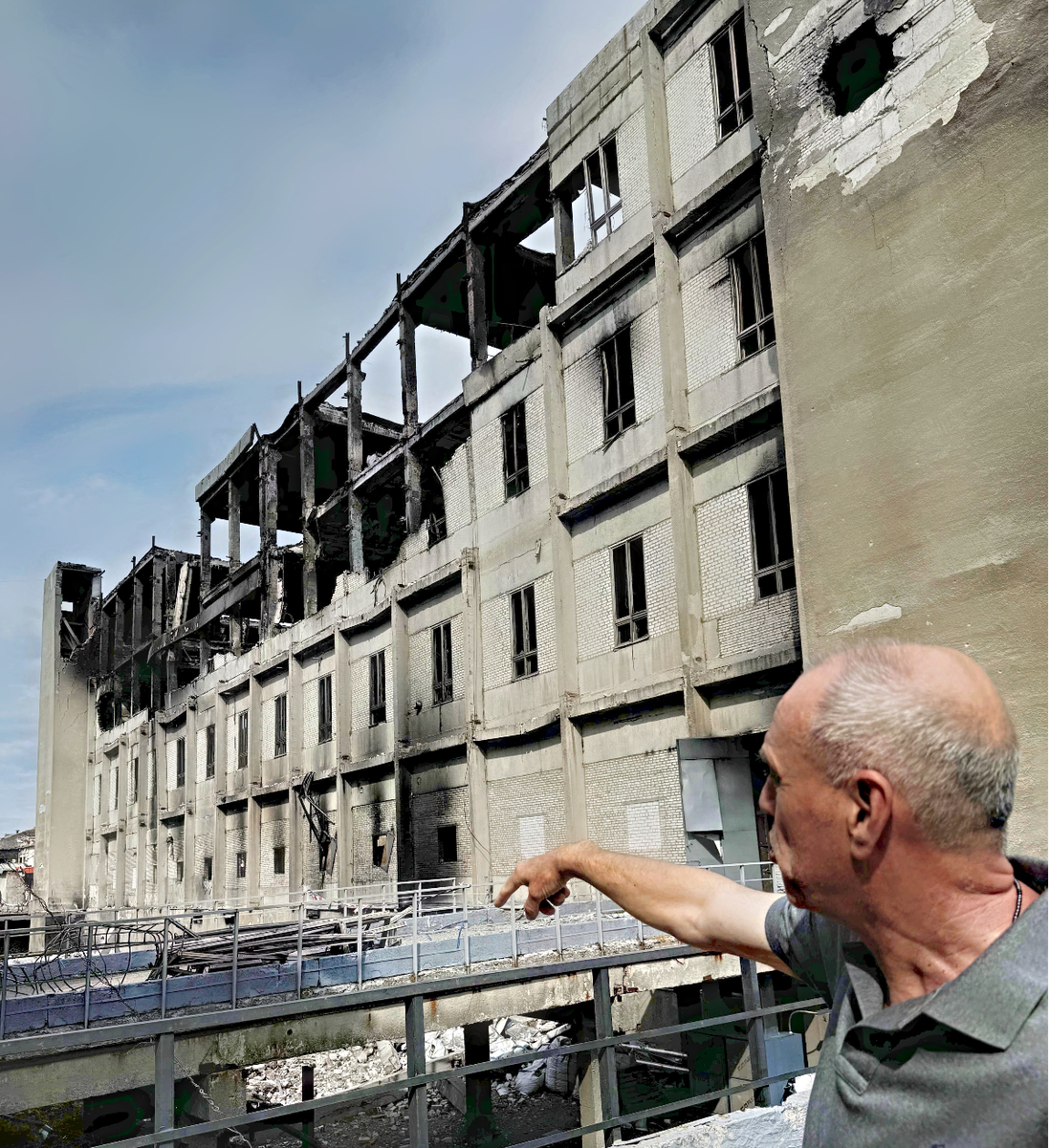
Photo above by Dave Morgan: Debant Ukraine
owner Vlad points to the bombed-out factory ruins.
Over the course of two hours on June 6, Russia launched almost 50 precision-guided munitions against a single factory in Kharkiv,
Ukraine’s second largest city, as reported in this BBC News article.
The factory was first hit by two
Iskander ballistic missiles, which can be detected only a minute or two before they strike. Then, a pair of Russian jets dropped four thermobaric glide bombs on the building, with those detonations
followed by 40 Iranian-made 400 pound Shahed drones, arriving in ones and twos in a steady stream over an hour and a half, many of them also carrying thermobaric warheads.
The Shaheds ignited
fires on the roof of the structure, which raged uncontrollably for more than five days, blanketing the city in smoke, as firefighters fought them day and night. Significant portions of a factory
building collapsed, burying and burning alive six workers who had spent the hours of the attack in a basement bomb shelter, patiently waiting for the all-clear signal.
advertisement
advertisement
Unfortunately, events
like this are almost a daily occurrence in Ukraine today, but there is something that you need to know about this attack.
The factory, owned by a company called Debant Ukraine, was well known
to the Russians. They targeted it for destruction, not because it made missiles or drones or tanks. It didn’t. It didn’t make anything even remotely close to weapons or munitions.
Instead, it was targeted for complete and total destruction because it was Ukraine’s largest producer of agricultural packaging, making specialized bags used in the transport of the many
tens of millions of tons of beans and seeds that Ukraine exports annually, vital to both Ukraine agricultural industry and the world’s food supply.
Why would Putin bomb a packaging
factory? Crippling Ukraine agriculture is the answer. Russia tried to blockade the Black Sea, but Ukraine drones destroyed much of the Russian fleet and chased the rest to the far east of the sea for
safety. Putin has tried hitting ships and loading facilities, but Ukraine’s missile defenses and antimissile efforts with Dutch-supplied F-16s have made that much harder.
The impact of
Ukraine’s agriculture on the world is enormous. According to the Kyiv School of Economics, “In 2021 [Ukraine] accounted for 10% of world wheat, 15% of corn and barley, and 50% of sunflower
oil exports.” The Middle East and Africa are enormously dependent on Ukraine’s food output. Controlling Ukraine’s food supply — and a big chunk of the world’s food supply
by extension — is one of the most critical objectives behind Russia’s historical efforts to dominate Ukraine.
Access and control to that food supply is a big driver behind
China’s support for Russia in the war. China is a net importer of food, as are Iran and North Korea, the other significant members of Russia’s axis against Ukraine and Western
nations.
To be clear, Russia’s horrific actions to control Ukraine and its people are based on something much more fundamental than having a “buffer zone” of protection from
NATO countries. For sure, Russia is threatened by the freedom, democracy and sovereign independence that Ukraine’s people so desperately want to keep. But it is more fundamental than that. It is
about humans’ basic needs for food. Russia wants to control Ukraine’s — and the world’s — food supply.
We are not in “The Ukraine War,” as many call
it. No, we are in the “Battle of Ukraine,” just as in 1940, we were in the “Battle of Britain,” a key pivot point of a much larger conflict, with much more basic elements at
risk than the control of a key piece of real estate.
As unfortunate as it is to admit, we are in a war being waged by Russia, Iran, North Korea and China against the Free World, with Ukraine
and Israel as the front-line chess pieces. NATO and most of Europe have been caught off guard, all of us are at risk, and terrorism directed at the world’s supply is a critical element in the
strategy.
This is a war we can neither ignore nor sit out. We’re already in it.